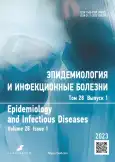Express method for determining the sensitivity of pathogens of bacterial complications in COVID-19 to bacteriophages
- Authors: Kraeva L.A.1, Konkova L.S.1, Burgasova O.A.2, Dolinny S.V.2,3
-
Affiliations:
- Saint-Petersburg Pasteur Institute
- Peoples’ Friendship University of Russia
- City Clinical Hospital V.P. Demikhov Department of Health of the city of Moscow
- Issue: Vol 28, No 1 (2023)
- Pages: 15-22
- Section: Original study articles
- Submitted: 02.02.2023
- Accepted: 27.02.2023
- Published: 22.03.2023
- URL: https://rjeid.com/1560-9529/article/view/181621
- DOI: https://doi.org/10.17816/EID181621
- ID: 181621
Cite item
Abstract
BACKGROUND: In recent years, there has been a catastrophic increase in the resistance of bacterial strains to antibacterial drugs. The spread of the novel coronavirus disease (COVID-19) pandemic has led to the overuse of antibiotics, which has led to an even greater spread of resistant strains in hospitals. Given the accumulated positive experience in using bacteriophages, it is advisable to use them in patients after determining the sensitivity of each strain of isolated bacteria to bacteriophages. Since Klebsiella pneumoniae was the most frequently isolated bacteria in complicated forms of COVID-19, it became necessary to determine the sensitivity of these and other gram-negative bacteria to the corresponding bacteriophages.
AIM: This study aims to reduce the time for determining the sensitivity of an isolated microorganism culture to bacteriophages by developing an express method.
MATERIALS AND METHODS: The study used 30 strains of pan-resistant Gram-negative microorganisms from the collection of the Museum of the Laboratory of Medical Bacteriology of the Pasteur Research Institute of Epidemiology and Microbiology in St. Petersburg: Klebsiella pneumoniae (n=10), Escherichia coli (n=10), Pseudomonas aeruginosa (n=10), and also preparations of bacteriophages manufactured by JSC “NPO Microgen:” Bacteriophage Klebsiella polyvalent purified; Bacteriophage coliproteus; Pseudomonas aeruginosa bacteriophage.
RESULTS: Of the strains studied, 4 out of 10 studied K. pneumoniae strains, 6 out of 10 E. coli strains, and 7 out of 10 P. aeruginosa strains were susceptible to polyvalent bacteriophage preparations. Reliable results were obtained 3 hours after the sensitivity of isolated cultures to bacteriophages was established, which is undoubtedly the most important finding of the study.
CONCLUSION: The developed method for determining the sensitivity of gram-negative bacteria to bacteriophages enables reducing the study time by 6 times (up to 3 hours), which affects the timing of etiotropic therapy selection with bacteriophages for each patient.
Full Text
About the authors
Lyudmila A. Kraeva
Saint-Petersburg Pasteur Institute
Email: lykraeva@yandex.ru
ORCID iD: 0000-0002-9115-3250
SPIN-code: 4863-4001
MD, Dr. Sci. (Med.), Professor
Russian Federation, 14 Mira street, 197101 Saint PetersburgLidiya S. Konkova
Saint-Petersburg Pasteur Institute
Email: lidia.kireeva@yandex.ru
ORCID iD: 0009-0007-5400-3513
SPIN-code: 3527-7121
MD
Russian Federation, 14 Mira street, 197101 Saint PetersburgOlga A. Burgasova
Peoples’ Friendship University of Russia
Email: olgaburgasova@mail.ru
ORCID iD: 0000-0002-5486-0837
SPIN-code: 5103-0451
MD, Dr. Sci. (Med.), Professor
Russian Federation, MoscowSergey V. Dolinny
Peoples’ Friendship University of Russia; City Clinical Hospital V.P. Demikhov Department of Health of the city of Moscow
Author for correspondence.
Email: sdolinny.ru@yandex.ru
ORCID iD: 0000-0002-0690-2174
SPIN-code: 7832-4832
MD
Russian Federation, Moscow; MoscowReferences
- Antimicrobial Resistance Collaborators. Global burden of bacterial antimicrobial resistance in 2019: A systematic analysis. Lancet. 2022;399(10325):629–655. doi: 10.1016/S0140-6736(21)02724-0
- Blair JM, Webber MA, Baylay AJ, et al. Molecular mechanisms of antibiotic resistance. Nat Rev Microbiol. 2015;13(1):42–51. doi: 10.1038/nrmicro3380
- Nikiforov VV, Suranova TG, Mironov AYu, et al. New coronavirus infection (COVID-19): Etiology, epidemiology, clinic, diagnosis, treatment and prevention. Study guide. Moscow; 2020. 48 p. (In Russ).
- Hill C, Mills S, Ross RP. Phages & antibiotic resistance: Are the most abundant entities on earth ready for a comeback? Future Microbiol. 2018;13:711–726. doi: 10.2217/fmb-2017-0261
- Brusina EB, Drozdova OM, Aleshkin AV. Problems of complex application of bacteriophages for prevention and treatment. Epidemiology and infectious diseases. 2018;(3):11–15. (In Russ). doi: 10.18565/epidem.2018.3.11-5
- Golkar Z, Bagasra O, Pace DG. Bacteriophage therapy: A potential solution for the antibiotic resistance crisis. J Infect Dev Ctries. 2014;8(2):129–136. doi: 10.3855/jidc.3573
- Patent RUS № 2785461 C1. Kraeva LA, Konkova LS. Express method for determining the sensitivity of gram-negative bacteria to bacteriophages. Available from: https://patenton.ru/patent/RU2785461C1. Accessed: 15.12.2022.
- Segall AM, Roach DR, Strathdee SA. Stronger together? Perspectives on phage-antibiotic synergy in clinical applications of phage therapy. Curr Opin Microbiol. 2019;51:46–50. doi: 10.1016/j.mib.2019.03.005
- Chan BK, Turner PE, Kim S, et al. Phage treatment of an aortic graft infected with Pseudomonas aeruginosa. Evol Med Public Health. 2018;2018(1):60–66. doi: 10.1093/emph/eoy005
- Castillo D, Rørbo N, Jørgensen J, et al. Phage defense mechanisms and their genomic and phenotypic implications in the fish pathogen Vibrio anguillarum. FEMS Microbiol Ecol. 2019;95(3). doi: 10.1093/femsec/fiz004
- Reyes-Robles T, Dillard RS, Cairns LS, et al. Vibrio cholerae outer membrane vesicles inhibit bacteriophage infection. J Bacteriol. 2018;200(15):e00792-17. doi: 10.1128/JB.00792-17
- Montso PK, Mlambo V, Ateba CN. Efficacy of novel phages for control of multi-drug resistant Escherichia coli O177 on artificially contaminated beef and their potential to disrupt biofilm formation. Food Microbiol. 2021;94:103647. doi: 10.1016/j.fm.2020.103647
- Harper DR. Criteria for selecting suitable infectious diseases for phage therapy. Viruses. 2018;10(4):177. doi: 10.3390/v10040177
- Kunz Coyne AJ, Stamper K, Kebriaei R, et al. Phage cocktails with daptomycin and ampicillin eradicates biofilm-embedded multidrug-resistant Enterococcus faecium with preserved phage susceptibility. Antibiotics (Basel). 2022;11(9):1175. doi: 10.3390/antibiotics11091175
Supplementary files







